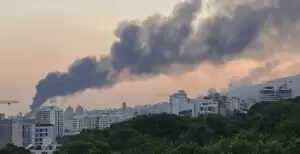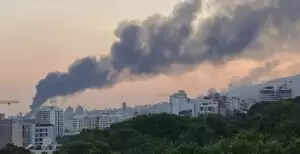
 Iran's Defiance Amid Escalating Conflict
Iran's Defiance Amid Escalating Conflict
Dubai: On Wednesday, Iran's supreme leader firmly dismissed the United States' demands for surrender amidst intense Israeli airstrikes, cautioning that any military action from the US would lead to 'irreparable damage.' This statement was delivered by a state television anchor.
Ayatollah Ali Khamenei, who has made a rare public appearance since the onset of the strikes, responded to US President Donald Trump's call for 'UNCONDITIONAL SURRENDER' via social media, where Trump ominously warned Khamenei that the US is aware of his location but has no immediate plans to eliminate him.
Initially, Trump distanced himself from Israel's unexpected assault last Friday that ignited the conflict. However, he has recently suggested a desire for a more significant US role, stating he seeks something 'much bigger' than merely a ceasefire. The US has also deployed additional warplanes to the region.
An Iranian official previously cautioned that US involvement could lead to 'all-out war.'
While the Foreign Ministry spokesman Esmail Baghaei did not provide specifics, thousands of American troops are stationed in nearby nations, within striking distance of Iran's arsenal. The US has threatened a substantial retaliation for any attacks.
Another Iranian representative indicated that the nation would continue its uranium enrichment for peaceful purposes, seemingly dismissing Trump's insistence that Iran abandon its contentious nuclear program.
Recent Israeli airstrikes targeted facilities involved in uranium centrifuge production and missile component manufacturing, according to the Israeli military. They reported intercepting ten missiles overnight as Iran's retaliatory strikes began to wane. The UN's nuclear watchdog confirmed that Israel had attacked two centrifuge production sites in and around Tehran.
The Israeli military also conducted operations in western Iran, targeting missile storage facilities and a missile launcher.
These strikes have resulted in significant casualties, including the deaths of high-ranking generals and nuclear scientists. A human rights organization based in Washington reported that at least 585 individuals, including 239 civilians, have died, with over 1,300 injured.
Iran has launched approximately 400 missiles and numerous drones in retaliation, resulting in at least 24 fatalities in Israel and hundreds of injuries. Some missiles have struck residential buildings in central Israel, leading to extensive damage and prompting air raid sirens that forced residents to seek shelter.
As the conflict progresses, Iran has reduced the number of missiles fired, though it has not clarified the reasons behind this decline. Israel has targeted missile launchers and related infrastructure.
The Washington-based Human Rights Activists group reported identifying 239 of the deceased as civilians and 126 as security personnel.
This organization, which has previously provided detailed casualty figures during the protests following Mahsa Amini's death in 2022, cross-references local reports with a network of sources within Iran.
Iran has not been consistently updating the death toll during the ongoing conflict and has historically downplayed casualties. Its latest report indicated 224 fatalities and 1,277 injuries.
Shops across Tehran, including those in the iconic Grand Bazaar, have closed as residents wait in long lines for gas and attempt to flee the city amidst the escalating violence.
A significant explosion was reported around 5 am in Tehran on Wednesday, following earlier blasts in the early morning hours. Iranian authorities have not acknowledged these attacks, which have become increasingly frequent as Israeli airstrikes intensify.
At least one strike seemed to target the eastern neighborhood of Hakimiyeh, home to a Revolutionary Guard academy.
Israel claims its strikes aim to prevent Iran from developing nuclear weapons, following stalled diplomatic discussions between the US and Iran that have shown little progress over the past two months. Trump indicated that Israel's military actions followed a 60-day window he had set for negotiations.
Iran has consistently maintained that its nuclear program is for peaceful purposes, although it is the only non-nuclear-armed nation enriching uranium to 60%, a step away from weapons-grade levels of 90%. US intelligence agencies have stated they do not believe Iran is actively seeking a nuclear bomb.
Israel is the sole country in the Middle East known to possess nuclear weapons, although it has never officially acknowledged this.
Iran's ambassador to Geneva, Ali Bahreini, stated that the country will continue to produce enriched uranium as needed for peaceful applications.
He dismissed any notion that the Israeli strikes would hinder Iran's nuclear research and development, asserting, 'Our scientists will continue their work.'
Bahreini characterized Trump's comments as 'completely unwarranted' and 'very hostile,' emphasizing that Iran cannot overlook such statements. He warned that if the US crosses any red lines, a response will be forthcoming.
For the first time since the onset of the conflict, Israelis began returning on flights as the country's international airport reopened.
Two flights from Larnaca, Cyprus, arrived at Tel Aviv's Ben Gurion International Airport on Wednesday morning, according to airport spokesperson Lisa Dvir.
Israel had previously closed its airspace to commercial flights due to ballistic missile threats, leaving many Israelis stranded abroad.